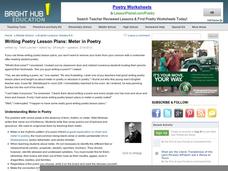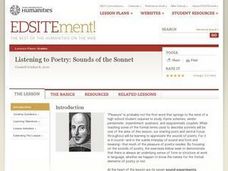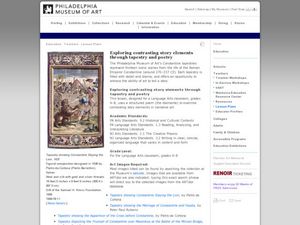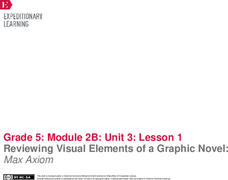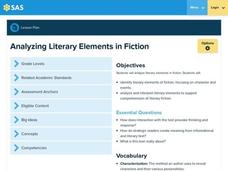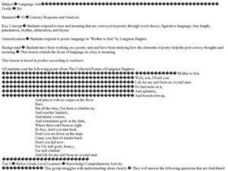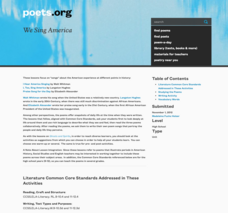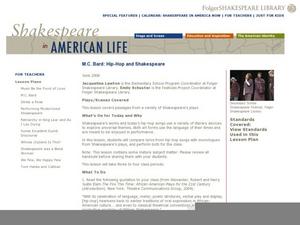MENSA Education & Research Foundation
Magical Musical Tour: Using Lyrics to Teach Literary Elements
Language arts learners don't need a lecture about poetry; they listen to poetry every day on the radio! Apply skills from literary analysis to famous songs and beautiful lyrics with a lesson about literary devices. As...
Curated OER
Poetic Elements Are Fun!
Engage your class in the elements of poetry with a series of lessons and activities. The plans cover simile, metaphor, personification, onomatopoeia, alliteration, and imagery. Learners come up their their own metaphors, identify poetic...
Curated OER
Poetry As Oral Performance
Reciting poetry is a great way to build oral language skills and build classroom community. Pupils look at the text elements of poetry and choose a poem to read aloud. They focus on rhythm, fluency, and expression. This is a great way to...
K20 LEARN
(Not Quite) Breaking All The Rules: Poetry And Grammar
FANBOYS will enjoy breaking grammar rules, but they will have to use coordinating conjunctions, gerunds, compound sentences, compound-complex sentences, and even predicates as they craft poems like Shel Silverstein.
Curated OER
"Your Son, Your Only One" - The Sacrifice of Isaac as a Motif in Holocaust Poetry
Class groups examine a series of poems that use Abraham’s willingness to sacrifice Isaac as a motif in Holocaust poetry. Included are questions, notes to the teacher, and bibliographical information on each poem. The activities could be...
Hong Kong Special Administrative Region
Learning English through Poems and Songs
Exposing learners to the power of words in poetry is a stimulating way to learn languages. Songs, haikus, rhyming words, and narrative works are all employed in a resource for teaching English as a Second Language.
EngageNY
Gathering Evidence and Drafting a Two-Voice Poem (Chapter 13: "Los Duraznos/Peaches")
Begin class with a short comprehension quiz and review and then move into a new genre: two-voice poems. The activity provides information about this type of poetry as well as a video example made by eighth graders that you can show your...
Curated OER
Meter in Poetry
A good poem has form and structure built into it. Middle schoolers see that the structure of a poem consists of stanza, form, rhyme, and meter. The structure also contributes to a poem's meaning. After listening to, and discussing, a few...
Curated OER
Listening to Poetry: Sounds of the Sonnet
Students investigate how sound influences meaning in poetry by listening to sonnets. They write an analysis after listening to and reading sonnets.
Curated OER
Exploring Contrasting Story Elements Through Tapestry and Poetry
Young thinkers view two narrative art tapestries and study the images included that tell a story about the Roman Emperor Constantine. As they examine the details of the tapestries, pupils use a Venn Diagram to record the similarities and...
EngageNY
Revisiting Big Metaphors and Themes: Revising and Beginning to Perform Two-Voice Poems
Now that your class has read all of Esperanza Rising, take the time to tackle big metaphors and themes. Pupils will participate in an activity called Chalk Talk, in which they circulate around the room in small groups and add...
Curated OER
Poetry Continued
Students are introduced to the elements in poetry. After listening to music, they discuss how it made them feel and what the lyrics mean to them. Individually, they are given specific elements to write their poem and share it with the...
EngageNY
Reviewing Visual Elements of a Graphic Novel: Max Axiom
Pass the tea! Using the resource, scholars participate in a Tea Party protocol to analyze text and images about inventions that helped meet societal demands. After sharing their observations with each other, they discuss visual elements...
Curated OER
Rhythm and Improv, Jazz and Poetry
Connect the ideas of jazz improvisation and art to writing poetry. Learners collaborate and write different lines of poetry, imitating the jazz styles of improvisation and freewriting. Take a close look at the poems "Tenebrae" by Yusef...
Curated OER
Rhythm, Verse and Rhyme: COMPOSING A LIST POEM
Students are provided an opportunity for self-expression. They collaborate with a partner and compose a list poem. Students practice reading and writing skills. They explore lists and catalogues--both elements of poetry and practical...
Curated OER
No Regrets: a Poetry Analysis
Students read a poem and use the TPCASTT strategy for analysis. In this poetry analysis activity, students journal about their future goals and read John Updike's "Ex-Basketball Player." Students discuss the purpose of the poem and...
Pennsylvania Department of Education
Analyzing Literary Elements in Fiction
Learners analyze the characters and events in fictional writing. In this literary elements lesson, students study the meaning of the words characterization and fiction. They listen to the story Pigsty by Mark Teague, or any other book...
Curated OER
Introducing Literary Elements in Fiction
Identify literary elements in fiction. In this reading comprehension instructional activity, learners read the book Pigsty and record literary elements onto a graphic organizer. They specifically discuss the main characters and events in...
Curated OER
Rhythm & Improv: Jazz & Poetry
Students analyze the elements of poetry and jazz. In this critical thinking skills lesson, students take a closer look at the rhyme, rhythm, alliteration, form, free verse, lyricism, and imagery that exist is jazz as well as poetry.
Houghton Mifflin Harcourt
Walt Whitman: From Song of Myself
Looking for a resource that models how to read and analyze a poem? Check out this packet that uses sections of Walt Whitman's "Song of Myself" to demonstrate how to paraphrase, note literary elements, and identify the poet's inferences.
Curated OER
Poetry language in "Mother to Son"
Sixth graders respond to poetry. In this poetry instructional activity, 6th graders read the "Mother to Son" by Langston Hughes and they are split into 3 groups for below, at and above grade level. Each group has a different activity to...
Academy of American Poets
We Sing America
Pair the famous poems "I Hear America Singing," by Walt Whitman, and "I, Too, Sing America," by Langston Hughes, with a more recent poem by Elizabeth Alexander called "Praise Song for the Day" to demonstrate a theme and introduce your...
Curated OER
M.C. Bard: Hip-Hop and Shakespeare
What is poetry? Does hip-hop qualify as poetry? Do Shakespeare's monologues qualify as poetry? Class members grapple with these questions as they examine the poetic elements and themes presented in different texts. Groups of four study...
Curated OER
Runny Babbit
Students are introduced to elements of poetry through the book Runny Babbit. In this poetry activity, students learn about the newest Shel Silverstein book, then examine the poem's form, rhythm, and rhyme. Students look for other Shel...







